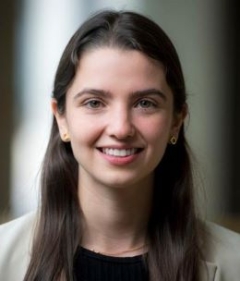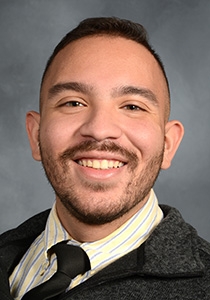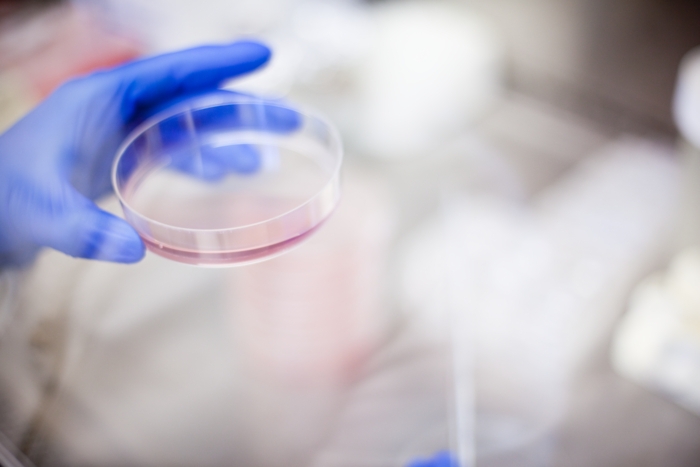Cinthia Garcia was always passionate about science and medicine. The first in her family to complete post-secondary education, she earned a Bachelor of Science degree at Emmanuel College in Boston in 2018 and then became a laboratory manager at the UC San Diego School of Medicine. Still, she dreamed of a career as a physician-scientist, pursuing translational research with the potential to improve patient care.

Cinthia Garcia
Garcia, who grew up in Hermosillo, Mexico, is now a second-year doctoral student in the Weill Cornell Graduate School of Medical Sciences’ Pharmacology Program and a fellow of the Weill Cornell Initiative for Maximizing Student Development Program (IMSD Program), which she credits for expanding her horizons in ways she previously considered impossible.
Launched in 2019, the IMSD Program aims enhance the training of Weill Cornell Graduate School of Medical Sciences’ doctoral students from varied experiences that are vital for scientific innovation, who are interested in building their leadership skills and have a passion for community engagement. The IMSD Program provides these students with funding, leadership training, professional skills and support networks for success in biomedical and science-related careers. The program received its initial funding through an NIH research grant and was recently awarded a five-year, $2 million training grant from the NIH’s National Institute of General Medical Sciences to ensure the program’s continuation.
For her research, Garcia is exploring new combination therapy approaches for treating glioblastoma, working in the lab of Dr. Ingo Mellinghoff, chair of the Department of Neurology at Memorial Sloan Kettering Cancer Center. “It’s very meaningful to be working in a high-profile lab on a research project that may lead to better treatments for patients,” Garcia said. “The IMSD program has also allowed me to consider career options beyond academia, and I have decided to apply to medical school.”
“We are fortunate to be able to continue supporting these amazing students,” said Dr. Ethel Cesarman, co-director and co-principal investigator of the IMSD Program and professor of pathology and laboratory medicine at Weill Cornell Medicine. “They have great potential for becoming successful leaders in their chosen biomedical and scientific fields.”
Upon their acceptance to Weill Cornell Graduate School of Medical Sciences, interested students apply and four fellows are chosen annually to enter the four-year program, where they receive full financial funding for their first two years of training and partial funding in years three and four.
“IMSD programs across the United States differ in their approaches,” said Dr. Yazmin Carrasco, co-director and co-principal investigator of the IMSD Program and assistant dean for diversity and inclusion at Weill Cornell Medicine. “We intentionally keep our cohorts smaller to maximize students’ opportunities for individualized mentorship from program leaders and peers.”
“Another element that sets our program apart is the early start summer program, which provides a welcoming, smaller-group orientation for students and will soon count as a course credit,” Dr. Cesarman said.
“The early start summer program gave me time to get established in New York City, meet other fellows, and begin my lab rotation,” Garcia said. “The program leaders welcomed me to the Weill Cornell community starting day one. Their guidance and mentorship have been invaluable.”
Additionally, this past year IMSD leadership organized a retreat at Cornell University in Ithaca, where students engaged in scientific presentations as well as community-building activities with their peers at the intercampus event. During the retreat, fellows also reflected on all the achievements of their community and set new goals for the upcoming academic year. This summer, Weill Cornell will serve as host for their Ithaca colleagues.
IMSD students have presented at major conferences, including the American Association for Cancer Research and the European Mucosal Immunology Group Meeting. Students have also won numerous awards, including fellowships from HHMI and the NSF Graduate Research Fellowship Program, and published in top-tier journals.
Like Garcia, Nickolas Almodovar, a fourth-year doctoral candidate in the BCMB Allied Program from New York City, was the first in his family to graduate from college. After completing a Bachelor of Science degree at Macaulay Honors College at the City University of New York, Almodovar chose Weill Cornell to learn how to apply science to questions that promote human health. He is investigating fundamental mechanisms essential for embryonic viability using mouse models in the lab of Dr. Ben Kleaveland, an assistant professor of pathology and laboratory medicine at Weill Cornell Medicine.

Nickolas Almodovar
Forty percent of IMSD Program students hold leadership positions as presidents, chairs, or leaders of affinity groups and executive committees. Almodovar became vice president and then president of the Graduate School Executive Council, the student government that represents the interests of graduate students and acts as a liaison with the administration.
“The IMSD Program is phenomenal. It has helped me develop the professional and soft skills needed to complete my Ph.D. and feel confident that I’m on the right track,” Almodovar said. “These skills helped me obtain a teaching assistant role, and they will make me more competitive as a future job applicant as I pursue an academic career path.”
Sixty percent of IMSD students are involved in mentorship or outreach activities. “Since the program began, we have built a growing community of Ph.D. students who benefit as mentees and, in turn, as mentors for younger-year peers,” said Dr. Roxana Mesías, IMSD Program manager and diversity program manager. “In the future, we plan to invite alumni to speak to the students about their different career paths after graduation.”
“One of the biggest highlights of the IMSD Program has been connecting with other students who share similar backgrounds and experiences,” Almodovar said. “I enjoy mentoring students navigating their first two years of graduate school as my way of giving back to the community.”

